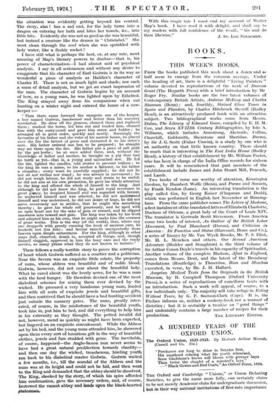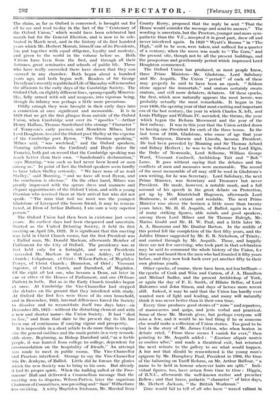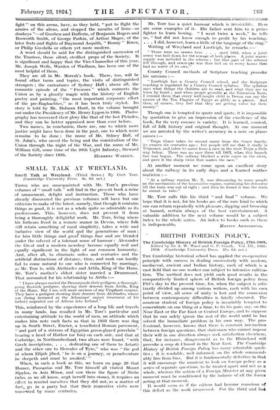A HUNDRED YEARS OF THE OXFORD UNION.
The Oxford Union, 1823-1923. By Herbert Arthur Morrah. (Cassell and Co. 21a.)
Perchance ere long to shine in Senates first, His manhood echoing what his youth rehearsed, Soon Gladstone's brows will bloom with greener bays Than twine the chaplet of a minstrel's lays." —" Black Gowns and Red Coats," An Oxford Poem, 1834.
Tun Oxford and Cambridge " Unions," or Union Debating Societies, to give the name more fully, can certainly claim to be not merely Academic clubs for undergraduate discussion, but in their way national institutions of first-rate importance
The claim, as far as Oxford is concerned, is brought out for all to see and read to-day in the fact of the " Centenary of the Oxford Union," which would have been celebrated last month but for the General Election, and is now to be cele- brated in March next, and in the history of its first hundred years which Mr. Herbert Morrah, himself one of its Presidents, has put together with equal diligence, loyalty and modesty, and given to the world in the volume before us. Both Unions have been from the first, and through all their fortunes, great seminaries and schools of public life. Those who have really succeeded there have shown that they cant succeed in any chamber. Both began about a hundred years ago, and both began well. Readers of Sir George Trevelyan's recently republished Life of Macaulay will remember the allusions to the early days of the Cambridge Society. The Oxford Club, on slightly different lines, sprang equally Minerva- like, fully armed with wit and weapons, into vigorous being, though its infancy was perhaps a little more precarious.
Oddly enough they were brought in their early days into a connexion at once significant and memorable. It is in 1829 that we get the first glimpse from outside of the Oxford Union, when Cambridge sent over its " apostles "—Arthur Henry Hallam, Thomas Sunderland (the strange " Character " of Tennyson's early poems), and Monckton Milnes, later Lord Houghton, to extol the Oxford poet Shelley at the expense of the Cambridge poet Byron. " The Oxonian speaking," Milnes said, " was wretched," and the Oxford speakers, Manning (afterwards the Cardinal) and Doyle (later Sir Francis), both put on record that the Cambridge speaking was much better than their own. " Sunderland's declamation," ays Manning, " was such as had never been heard or seen among us." In point of fact the Oxford speakers seem hardly to have taken Shelley seriously. " We have none of us read Shelley," said Manning, " and we have all read Byron, and the conclusion is obvious." On the other hand, Milnes was greatly impressed with the spruce dress and manners and elegant appointments of the Oxford Union, and with a young Oxonian who received them at their arrival but who did not speak. " The man that took me most was the youngest Gladstone of Liverpool (the bosom friend, it may be remem- bered, at Eton of Arthur Hallam), I am sure a very superior person."
The Oxford Union had then been in existence just seven years. Its earliest days had been chequered and uncertain. Started as the United Debating Society, it held its first meeting on April 5th, 1823. It is significant that this meeting was held in Christ Church rooms, but the first President was A Balliol man, Mr. Donald Maclean, afterwards Member of Parliameht for the City of Oxford. The presidency was at first held only for a fortnight, and seven Presidents ucceeded Mr. Maclean in that year, Ashley, of Christ hurch ; Colquhoun, of Oriel ; Wilson-Patten, of Magdalen Powys, of Christ Church ; Bramston, of Oriel ; Viscount Ingestre, of Christ Church, and Durnford, of Magdalen. Of the eight all but one, who became a Dean, sat later in ene or other of the Houses of Parliament, and one (Wilson- Patten) in both. But as in the Early Church troubles began at once. At Cambridge the Vice-Chancellor had stopped the debates on the ground that they interfered with study. At Oxford the first foes were those of its own household, and in December, 1825, internal differences forced the Society to dissolve and to reconstitute itself two days" later—on December 5th, 1825—without the disturbing element and with anew and shorter name—the Union Society. It had "died to live," and from that date to the present day its life has been one of continuous if varying vigour and prosperity.
It is impossible in a short article to do more than to empha- size the general outlines and the main points in a very remark- able story. Beginning, as Bishop Durnford said," as a feeble people, it was hunted from college to- college, dependent for accommodation on the hospitality of friends." An attempt was made to meet in public rooms. The Vice-Chancellor and Proctors interfered. Strange to say the Vice-Chancellor was Dr. Jenkyns, of Ralliel. Little did he foresee the glories which the new Society was to bring to his own. But already it had its proper spirit. When the bulldog called at the Free- masons' Hall and delivered a Cromwellian message that the meeting was to disperse, Wilson-Patten, later the sagacious Chairman of Comthittees, was presiding and " Sam" Wilberforce was sneaking. A witty Magdalen Irishman, Mr. Marshal front
County Kerry, proposed that the reply be sent " That the House would consider the message and send its answer." The wording is uncertain, but the Proctors, younger and more sym- pathetic than the V.C., accepted it in good part, drew off and never interfered again. In 1829 " Wyatt's Rooms " in "The
High," still to be seen, were taken, and sufficed for a quarter of a century, when the move was made to " The Corn," and- the present site, though not to all the present buildings, and the prosperous and gentlemanly period which impressed Lord Houghton commenced.
The Oxford Union has produced, as most people know, three Prime Ministers—Mr. Gladstone, Lord Salisbury and Mr. Asquith. The Union " period " of each of these may properly be said to have been an epoch. • " Seldom alone appear the immortals," and orators certainly create orators, and still more debaters, debaters. Of these epochs, the first, which now naturally appears the most heroic, was probably actually the most remarkable. It began in the year 1830, the opening year of that most exciting and important era of the last century, the year in which Charles X. left, and- Louis Philippe and William IV. ascended, the throne, the year which began the Reform Movement and the year of the first railway. It was in this year that the Union settled down to having one President for each of the three terms. In the last term of 1830, Gladstone, who came of age that year with Tennyson, Darwin and Lincoln, became President. He had been preceded by Manning and Sir Thomas Acland and Sidney Herbert ; he was to be followed by Lord Elgin, the Duke of Newcastle, Lord Selborne, William George Ward, Viscount Cardwell, Archbishop Tait and " Bob " Lowe. It goes without saying that the debates and the conflicts of men and measures were memorable. The record of the most memorable of all may still be read in Gladstone's own writing, for he was Secretary. Lord Salisbury, the next Prime Minister, was Secretary and Treasurer but never President. He made, however, a notable mark, and a full account of his speech in the great debate on Protection, got up by Mr. Knatchbull Hugessen, afterwards Lord Brabourne, is still extant and readable. The next Prime Minister rose above the horizon a little more than twenty years later, Mr. II. H. Asquith, of Balliol, again in a time of many striking figures, able minds and good speakers, among them Lord Milner and Sir Thomas Raleigh, Mr. Marius Gould and Mr. H. W. Paul, and a little later Mr. A. A. Baumann and Mr. Dunbar Barton. In the middle of this period fell the completion of the first fifty years, and the Jubilee Dinner suggested by Mr. E. B. Nicholson, of Trinity, and carried through by Mr. Asquith. Those, and happily there are not few surviving, who took part in that celebration may be said to command the whole history of the Union, for they saw and heard then the men who had founded it fifty years before, and they now look back over yet another fifty to their own glorious youth.
Other epochs, of course, there have been, not less brilliant= the epochs of Cook and Wise and Curzon, of J. A. Hamilton and Michael Sadler, and the present Archbishop of York, or again the day of F. E. Smith, of Hilaire Belloc, of Lord Balcarres and John Simon, and days of heroes more recent still. Indeed, it may be said that the Union has hardly ever wanted men of light and leading, and many will naturally think it was never better than in their own time.
Every time produces good stories of " rows " and repartees, of manoeuvres and quips, and jests verbal and practical. Some of these Mr. Morrah gives, but perhaps everyone will miss a few, and it would be no bad thing if he or someone else would make a collection of Union stories. Too good to be lost is the story of Mr. James Cotton, who when beaten in debate cried, " From these scenes I vanish for ever," then pointing to Mr. Asquith added : " Exoriare aliquis nostris ex ossibtts ultor," and made a theatrical exit, but returned the next minute to the gallery to see what would happen. A ban mot that should be remembered is the young man's epigram by Mr. Humphrey Paul, President in 1908, the time of the balancing on Tariff Reform, on Mr. Arthur Balfour, " a name to be held in honour where ver 'hairs are split." Indi- vidual figures, too, have arisen from time to time : Higgin, of B.N.C., afterwards the well-known reciter and preacher Bellew ; and that brave, pathetid " character " of later days, Mr. Herbert Jackson, " the British Workman."
Time would fail to tell of all who have " waxed valiant hi fight " on this arena, have, as they held, " put to flight the armies of the aliens, and stopped the mouths of lions—or donkeys "—of Goschen and Dufferin, of Benjamin Rogers and Bosworth Smith, of George Parkin, of Arthur Magee, of the later feats and flights of Raymond Asquith, " Ronny " Knox, or Philip Guedalla or others yet more modern. A word should be said for the distinguished succession of the Trustees, those silent, stedfast props of the Society. It is significant and happy that the Vice-Chancellor of this year, Mr. Joseph Wells, Warden of Wadham, has been one of the most helpful of them.
They are all in Mr. Morrah's book. There, too, will be found other turns and topics, the visits of disting-iiished strangers ; the caricatures of Sydney Hall ; above all, the romantic episode of the " Frescoes " which connects the Union as by a ghostly magic with the history of English poetry and painting, " the most important corporate effort of the pre-Raphaelites," as it has been truly styled. Its story is told by Mr. Holman Hunt, in the volume brought out under the Presidency of Mr. Henry Lygon in 1906. Photo- graphy has recovered their glory like that of the lost Pleiades, and they can be better appraised now than ever before.
Two names, in conclusion, there are, one to which more justice might have been done in the past, one to which more remains to be done ; the name of Mr. Sidney Ball, of St. John's, who saved the being and the Constitution of the Union through the night of the War, and the name of Mr. William Gill, some time of the 90th Light Infantry, Steward












































 Previous page
Previous page